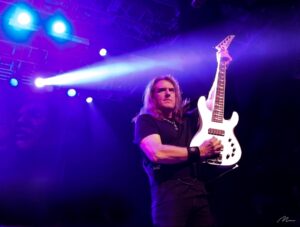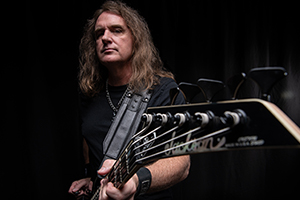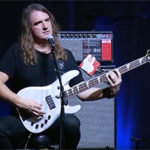Megadeth bassist releases new album of classic covers
Exclusive interview with FBPO’s Jon Liebman
October 5, 2020
Photo By Anthony Frisketti
Grammy-winning bassist David Ellefson, best known as the co-founder and longtime bass player of the iconic metal band, Megadeth, has also been involved in various side projects, including Soulfly, F5, Temple of Brutality, Altitudes and Attitude, and Metal Allegiance. For his newest venture, David fronts his own band, Ellefson, with an album of classic cover tunes, No Cover, which was released October 2.
FBPO: What inspired you to do an album of covers?
Ellefson: It started, I had come home from recording the new Megadeth album down in Nashville back in early June, and my partner, Thom Hazaert, and I were discussing the state of affairs in the world and reconsidering whether we should put out the next Ellefson solo album as planned in October, and I think it became pretty apparent that it doesn’t really make much sense to put out a new record of all original material that’s going to require some promotion around it and touring this year. It would just pretty much fall through the cracks and pretty much disappear. This idea of, “Well, why don’t we just go record a few covers,” initially, it started (with) maybe just a half a dozen of them, like an EP or something, and as we started brainstorming the songs to do, it pretty quickly turned into an album, and now it’s landed as a very full double album with I think about 18 songs and even some bonus tracks. Honestly, it was a nice way to just keep the creativity moving, but also keep our community connected. And I think that was as much the realization as we got into it, that during this time it’s just nice to keep us all connected and keep everybody playing and recording, and revisiting our past record collections was a pretty easy reach for all of us. And that is the backstory, leading up to today.
FBPO: How did you go about picking the tunes? It sounds like you kept adding more and more, but at some point you had to say, “Okay, I think we’ve got enough.” So how did you decide which ones made it?
Ellefson: Well, you know, I wanted to do the songs that inspired me as a bass player, as a guy who got excited about starting a band when I was just a pre-teenager. So some of those songs go back to, like, “Sweet FA,” “Not Fragile,” “Love Hurts,” things like that. And then things that were inspiring to me during my teenage years, which would certainly be Def Leppard “Wasted,” and things like that. And “Sheer Heart Attack” for sure. And then Thom is 10 years younger than me, so the things that inspired him were things like W.A.S.P. “Love Machine.” Probably right around the time, like 1983, I landed in Hollywood, the Fastway song was blowing up the charts all over radio, so as I was getting ready to start my adult professional career as a musician, Fastway was inspiring me, and W.A.S.P. was inspiring an 8- or 9- or 10-year-old Thom Hazaert back in Green Bay, Wisconsin! [Laughs] So it’s kind of funny how the same music heard by two different ears had the same impacts all these years later.
FBPO: How did you decide who was going to play on the album? Does the Ellefson band have a core group of players that was supplemented with special guests?
Ellefson: It does, it does. So it’s me on bass, Thom Hazaert on vocals, Andy Martongelli on guitar, Bumblefoot also now on guitar and vocals with us, and our drummer Paulo Caridi. Paulo and Andy are both from Italy, and so we work remotely. Even our mix engineer, Alessio Garavello, up in London, is a friend of Andy’s. So basically, we’ve got three Italians and three Americans that are part of the Ellefson hit factory, if you will. [Laughs] And it’s a really great team. It’s funny that with the time difference over to Europe, we can send ideas via text, email, or WhatsApp, and while I’m sleeping, Andy is taking my ideas and turning them into reality so that when I wake up, I can pull out my bass and start recording and Thom can start recording over here. It’s almost like we’ve got two studios working full time, literally around the clock, because of the time difference. So yeah, we have a core band. And even our U.S. touring band last year was made up of a group on Combat Records called Dead By Wednesday, which is guitar player Dave Sharpe and drummer Christian Lawrence. They’re out of the Connecticut area, and they brought to us the idea of doing the Krokus song “Eat The Rich,” which is a great record. Amazing band back in that day, a real player in the sort of MTV era of heavy metal in the early ’80s. Essentially, we’ve got all the musicians of our core U.S. and European touring band as the centerpiece of the Ellefson sound.
FBPO: How about the guests?
Ellefson: As far as the guests who came in, we found that just letting the songs dictate the collaboration was the best way to go. For things like “Freewheel Burning” and “Riff Raff,” Jason McMaster from Dangerous Toys has a Judas Priest and an AC/DC cover tribute band that he plays in, so he was an easy, natural choice. For “Sheer Heart Attack,” I wanted to hear a female voice because of the sweetness of the Queen vocal sound. And Doro (Pesch), she was on the MegaCruise back in October, and she and Thom got to sing together during a big KISS jam that I put together as an all-star event on the cruise. It was just great to bring her back into our wheelhouse because we kind of grew up together, Doro and I. Things like that. To bring my friend Greg Handevidt, who had been my best friend growing up, and we were in bands together in Minnesota, and he even moved to LA with me and played with me and Dave (Mustaine), and came up with the idea that we should call the band Megadeth based on the song title that Dave had called “Megadeth.” So it was fun to bring him back into the heavy metal playground again and have him sing and play guitar on the Motörhead song, “Love Me Like A Reptile,” which is a song we used to play together in our band back in Minnesota when we were teenagers. So the friendship on this thing is very wide and all encompassing.
FBPO: I’ve got to make special mention of the bass intro on “Not Fragile” on the new record. It’s so clean! It really sounds great.
Ellefson: It’s funny, I used a handful of basses on the record. For the most part, I have a Modulus Quantum 5. It’s a silver one that I’d recorded the second F5 record with it back in 2007 or something. It really holds the pitch well, especially if you’re drop tuning at all. This record is not a drop tuned record. We’re just a half step down into E flat, but it’s all standard tuning throughout because I wanted to keep the songs intact to their original compositions. But it’s funny how there’s a couple of tracks that I think that Modulus was used pretty much throughout the entire record. I used my Spector pre-Kramer NS2 on the Krokus song “Eat the Rich.” And for that “Not Fragile” intro, that was a very particular song. I even pulled out my Steve Harris Fender Signature P bass that I had put some D’Addario flatwounds on. And I was hoping to use that one. But because it’s a passive bass, you hear dead spots on the neck, which is very typical of a Fender. And unfortunately, one of the notes that’s a C, which would be the eighth fret on the E string, that is a very particular note I needed to hear, and that bass, it wasn’t pulling it out. I tried several basses, and all of a sudden I thought, you know, I’ve got this Music Man sitting in my closet. I’ve got two Music Mans, a 4 and a 5. So I pulled out the 5-string, and sure enough, it was dead on the money. It just had a nice, clear sound, the action was high enough that it didn’t have any fret rattle. The Music Man was not an instrument that I’ve been able to use very much because for some reason the placement of that pickup doesn’t lend itself well to the music that I play. You know what I mean? So it’s just not a bass that I can use very often. But in this case it was perfect because it had a nice round punch to it without any string rattle. Because it definitely didn’t, it could not have my typical kind of Jackson bass, thrash metal sound. That was totally the wrong sound for that intro.
FBPO: You mentioned every kind of bass except Jackson. I’m waiting and waiting and waiting… finally you said it! I’ve always known you as a Jackson guy. Are you saying it didn’t really fit the flavor of the record?
Ellefson: It didn’t, it didn’t. I invent Jackson basses, I create them, we sell them, they have my name on them, I play them live, obviously with Megadeth and pretty much everything else that I do, because they’re such a great live performance instrument. But the truth is, when you’re recording, you have to use whatever is going to work in the track in that studio at that moment with everything else that’s around it, the drums, guitars, whatever else is going on around it. And recording is a whole art and science in and of itself. When I go into records, when I’m looking at gear to record with, I approach it very scientifically to make sure that I’m using the right … It’s why I generally play with a pick, because every time I go to use fingers, I swear to God, 99.9 percent of the time, the engineer will go, “Yeah, go back and use the pick, it sounds better.” And they’re not even talking musically, they’re talking just from a sonic output of the instrument through the reference monitors that they’re listening to in the studios. The pick always wins, especially in rock music, and the heavy rock music that I play, because it’s the thing that helps the bass have a point to it and stick out through the wall of guitars and the big drums. And it allows me to get the bass down inside the kick drum but yet have some definition to it, so it doesn’t just get buried down there.

Photo By Annalisa Russo
FBPO: I didn’t know you ever played with your fingers. I can’t remember ever seeing you not use a pick.
Ellefson: Yeah, I’m a pretty good finger player. I’ve played with both. Thanks to your books, I’ve become a little bit better slap and pop funk player, but it’s not a style that I use very often. But yeah, I’m definitely a good finger player. And there’s certain things where I have used fingers, like in the middle, the breakdown of the Megadeth song “Trust,” I switch to fingers real quickly because the sensitivity of the song doesn’t need the full-on thrashing assault of a pick. It needs dynamics and sensitivity. For me, and this probably came from me playing in jazz band as a teenager, I really had to adapt and learn about dynamics and sensitivity, that everything can’t just be louder than everything else all the time, otherwise there’s just no dynamics to the music, you know?
FBPO: Yeah.
Ellefson: So even in metal and hard rock, there are moments where I will set the pick down and use fingers just because the part has, it creates a better dynamic so that then when the whole band hits and it gets big, I grab the pick, and yeah, there’s the big thunderous classic Ellefson tone that you would expect to hear. But as a bass player, we’re unique because we can be composers, we can be instrumentalists, we can sometimes be the composer and author of the song and yet also sometimes we can just be playing the bass to someone else’s song. So as a bass player, it’s kind of unique because we can come into it with many different approaches, and I think that the approach of the song is always more important than just walking in saying, “Hey, I’m David Ellefson, here I am. Where do I set my amp so I can sound like me?” And sometimes I get hired to play like me. Other times I’m there to be the best bass player that the song needs. I find that walking in to any session, it’s best to know what you’re hired for, you know? What their expectation is of you.
FBPO: How about the rest of your gear? You mentioned D’Addario. Is that what you use primarily, or was it that just you wanted the flatwounds for that one particular track?
Ellefson: Yeah. I’ve had these D’Addario flatwounds, I’ve literally probably had these things for, I’m not going to lie, probably close to 20 years, and they’ve been sitting in my storage unit. I always see them and I always go, “What bass can I put them on, what can I use them for?” And I finally, this year I pulled them out and I put them on the Steve Harris one because Steve uses Rotosound jazz bass strings, which are a flat. I think they’re kind of like a bright flat. I actually have a set at home, and I should pull them out. I’ve got some Rotosounds, literally from back in the ’80s, at my house, ’80s, early ’90s, and I kind of keep them just as a memory piece (from) when I was a Rotosound endorsee. But I keep a bunch of different strings around for the same reason that I keep a bunch of different basses and amps and different plectrums around, because you never know what a recording session may require of you, and what is going to be the right instrument or the right piece of gear for that particular session. My normal strings I use are S.I.T. Power Wound Nickel, and now I actually have a new set of strings from them that are a signature brand, so I’ll have two signature lines with them. It’s a new one, it’s a different type of wind of a roundwound, and it’s now probably my preferred one, just because in some of my solo stuff, it has a little bit more clarity to it, to the strings. So S.I.T. is my main go-to string.
FBPO: What about amps?
Ellefson: As far as amps, I’ll use Hartke amps, but I don’t always use an amp in the studio. When Frank Bello and I were recording our Altitudes and Attitude record, I just plugged straight into a Kemper, and it sounded amazing. On this particular record, you know with Megadeth we build a whole wall of amps. We use Ampeg, Peavey, Hartke, we use all kinds of stuff. We build a wall of things. With this particular record, I recorded in two locations. One was at my friend John Aquilino’s studio called the Platinum Underground, in Mesa, Arizona. It’s a $2 million studio with the best pre-amps and everything you could imagine, as well as Focusrite consoles and everything. Most of it though, because we were doing it kind of in a COVID moment, and social distancing, I used an IK multimedia input box, and I ran that into Logic, and that’s how I recorded most of my bass tracks at home, and then I would send them over to Italy for Andy to continue building the rest of the session, and for Alessio to mix it up in London. Yeah, the IK multimedia, are you familiar with that box? Do you know what that is?
FBPO: I haven’t used it much, but I definitely know the brand.
Ellefson: It’s great. It is a really great sounding pre-amp and input box. And quite honestly, when I’m just recording on my own, I really like the sound of Logic. I think Logic has a much warmer low end, and much better characteristics for recording bass guitars than Pro Tools or any of the other DAWs do. It’s hands down my favorite, even if just for recording bass, and probably even some drum stuff, just because it captures such great low end. And then, at some point of course, everything goes to Pro Tools for mixing. The beauty of working in a digital environment is that everybody can use whatever they needed in their home studios to record their parts.

Photo By Melody Myers
FBPO: What can you share about what’s happening with Megadeth? Well first of all, how’s Dave doing?
Ellefson: He’s doing fine. He’s doing well. Getting through the cancer treatment last year, I think the tour we did with Five Finger Death Punch over in Europe, I think that was sort of the moment we needed to just be able, for him individually but us for as a group, to confidently be able to go, “Okay, good, glad that moment is behind us, that season is behind us, and Dave has overcome cancer, and we can move forward now.” I mean look, Dave’s not, he’s obviously very careful with it, but at the same time, it was nice for us to rally together with the band, with our fans, and have this moment of, I think it was a real appreciation to go, “Wow, that was close!” It was one of those moments where you realize at any given moment something could happen, or that it could all go away. And I think it further helps all of us appreciate just how special the band is, how special our legacy and our fans are. And it was great just to be able to take it around the track, around Europe, and celebrate that. What was interesting is COVID was right on our heels. I mean it was literally developing across Europe right behind us everywhere we went. We got home safely without any incidents, but then immediately, of course, had to shut everything down like everybody else did. But it did open up an opportunity for us to really get focused on album number 16, which the basic tracks are pretty much finished.
FBPO: Are you still calling it number 16? You don’t have a name for it?
Ellefson: Well, yeah, because we don’t have a title that we’ve announced yet, so for now it’s album 16. It’s album 16 until we have the official title. To your question, there’s not a lot I can tell you, but what I can tell you is that basic tracks are mostly recorded, and that’s basically the focus right now of what the band is working on until things open up next year.
FBPO: Can you tell us when it will be out?
Ellefson: No. I don’t have a release date for you.
FBPO: What about the future, David? What else are you hoping to do once we get through this crazy period?
Ellefson: Well, (after) this record, I have another solo record of original material that is probably about two thirds done. The No Cover record actually gave me a little time to step away from it and have some fun with my buddies, and now get back into that album again. Of course, the Megadeth record should be dropping next year as well. And then as things hopefully turn a corner with this pandemic, things will be opening up in some way, shape, or form, and I’m looking forward to getting back out and taking the stage and touring again. This year has mostly been one of more solitude and learning to work remotely, which has been good for me. But I’m definitely looking forward to getting back out on the stage.
FBPO: Have any dates been scheduled?
Ellefson: I’ve got some solo dates with Ellefson and Saliva in Texas and Louisiana over the Halloween weekend, so that’ll be our first “run it up the flagpole” of being out in the live events calendar. And then the Megadeth stuff is scheduled for next summer 2021. We’re putting together some international stuff as well. The idea is that this is an album that can be heard everywhere. The digital thing opens that up a lot as well for everybody to be able to hear it around the world.
See Jon’s blog, with key takeaways from this interview, here.





